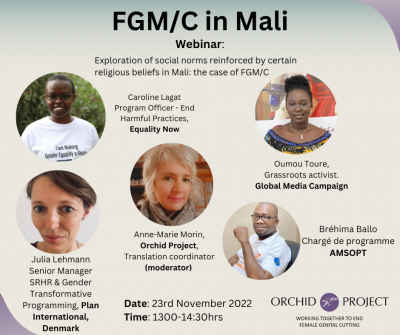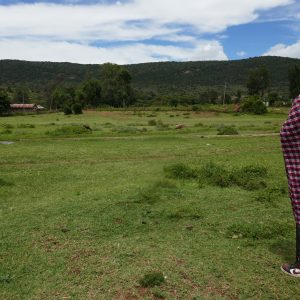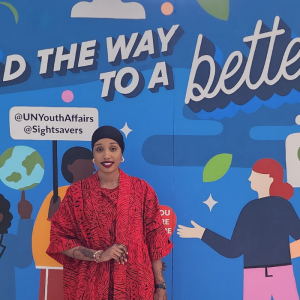.
The webinar topic was ‘Exploring social norms reinforced by certain religious beliefs in Mali: The case of FGM/C’. The discussion will be in French, with English interpretation.
If you missed the webinar, don’t worry, you can watch it here.
Panel:
Caroline Lagat, Program Officer, End Harmful Practices, Equality Now
Bréhima Ballo, Chargé de programme AMSOPT
Julia Lehmann, Senior Manager SRHR & Gender Transformative Programming, PlanBørnefonden [Plan International in Denmark]
Oumou Toure, Grassroots activist Global Media Campaign,
The moderator was Anne Morin, Translation Coordinator, Orchid Project.
Lors du lancement du rapport, notre panel explorera les défis et les opportunités de répondre aux normes sociales préjudiciables qui sont renforcées par certaines croyances religieuses. Nous explorerons cette question à trois niveaux : au niveau législatif, au niveau de la programmation nationale et au niveau de l’engagement communautaire. Dans chaque cas, nous explorerons comment s’engager de manière positive sur les questions de religion (et par extension comment engager le dialogue avec les chefs religieux) afin d’aborder la question des MGF/E au Mali.
In launching the Mali Country Profile Update, our panel will explore the challenges of, and opportunities for, addressing social norms that are reinforced by certain religious beliefs. We will explore these at three levels: the legislative level, the national/programming level, and the community-engagement level. In relation to each, the panel will also consider how one might positively engage with issues of religion (and, by extension, religious leaders) to address the issue of FGM/C in Mali.
Nos dernières recherches sur les MGF/E au Mali font état de très peu de progrès dans la prévalence, qui reste l’une des plus élevées au monde à 88,6 %. Le Mali fait également partie des quatre pays africains où la pratique des MGF/E continue à être légale.
Il existe des variations importantes dans la pratique entre les différentes régions et groupes ethniques au Mali – allant de 96% dans les régions du sud à moins de 2% dans le nord-est. La religion continue de jouer un rôle clé dans la poursuite des MGF/E dans le pays, 70% des femmes estimant qu’il s’agit d’une exigence religieuse et 75,8% approuvant son maintien. Les filles au Mali sont les plus exposées au risque de MGF/E au cours des 5 premières années de leur vie, l’âge moyen de l’excision étant actuellement inférieur à 2 ans et demi.
Our latest research in Mali reveals very little progress towards lowering the prevalence of FGM/C, which remains one of the highest in the world at 88.6%. Mali is also one of four African countries in which FGM/C is practised where it remains legal.
There are significant variations in prevalence between different regions and ethnic groups in Mali – from as high as 96% of women in the southern regions to less than 2% in the north-east. Religion continues to play a crucial role in the continuation of FGM/C in the country: 70% of women believe that FGM/C is a religious requirement, and 75.8% support its continuation. Girls in Mali are most at risk of FGM/C within the first five years of their lives, as the mean age of cutting is currently less than 2.5 years.





